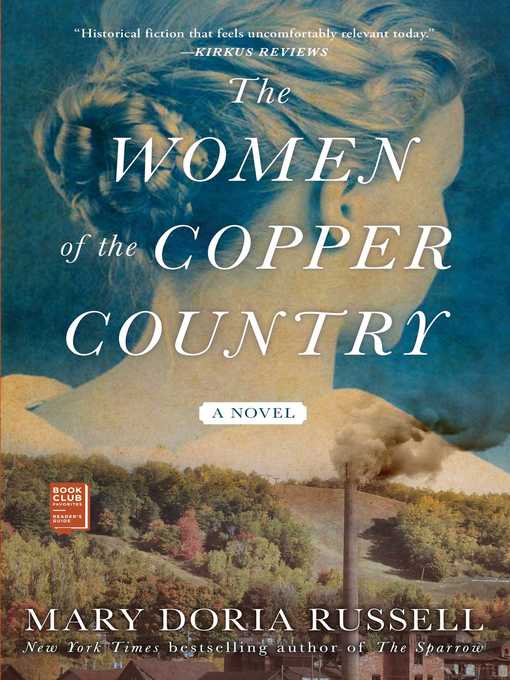
The Women of the Copper Country
A Novel
کتاب های مرتبط
- اطلاعات
- نقد و بررسی
- دیدگاه کاربران
نقد و بررسی

April 15, 2019
Russell’s latest historical, a carefully researched rendering of the Copper Country strike of 1913–1914, pays meticulous attention to detail that is often fascinating but occasionally tedious. Charlie Miller comes to Calumet, a company town on Michigan’s Upper Peninsula, to organize the local copper miners, and his rhetoric inspires idealistic Annie Clements to lead the Women’s Auxiliary of the Western Federation of Miners, Local 15, despite her husband’s disapproval. After a worker is fatally injured—an all-too-common event—the miners vote to strike. As weeks turn into months, the Women’s Auxiliary works tirelessly to keep the miners and their families fed and clothed and to keep everyone’s spirits up. The painstakingly comprehensive narrative and omniscient point of view make for a deliberate pace, but they also ensure readers completely understand what happened. The tale is often bleak, but it serves as a worthwhile counterpoint to historical writing centered on “great men.” Agent: Jane Dystel, Dystel, Goderich, & Bourret.

June 1, 2019
Russell (Epitaph, 2015, etc.) offers a lesson in American labor relations in this fictional portrait of Anna Klobuchar Clements, a 25-year-old miner's wife who led a wildcat strike against the large Calumet, Michigan, copper mining company Calumet & Hecla in 1913. Though little remembered today, Annie Clements acquired the soubriquet "America's Joan of Arc" for her leadership during the monthslong labor uprising involving as many as 9,000 miners. Annie comes across as a larger-than-life heroine--physically striking at 6-foot-1--although also a warmhearted woman with an increasingly conflicted emotional life. Initially she seems no different from other miners' wives, stretching pennies to keep house while accepting her husband Joe's drunken bluster and beatings without complaint. Her sorrow is that after seven years of marriage she has yet to conceive. Instead of motherhood, Annie has thrown herself into her responsibilities as president of the Women's Auxiliary of Local 15, the Western Federation of Miners. No matter that Joe refuses to join the union. A miner's death pushes Annie to call for a strike to improve salaries and safety conditions. Experienced union organizer Charlie Miller (a fictional composite of two real union leaders) doubts the strike will succeed, but he recognizes that Annie is a powerhouse he must support. Charlie invites photographer/reporter Michael Sweeney (also a composite) to Calumet to get national coverage. Michael finds himself drawn not only to the drama of the strike, but also to Annie, who inevitably discovers she reciprocates his desire. Union icon Mother Jones makes a cameo appearance, and then there's Annie's real-life nemesis, James MacNaughton, the company's general manager, whose interest in hygiene seems almost progressive until he reveals himself as a greedy capitalist committed to maximum efficiency and profit whatever the human cost. Russell writes with her usual verve, but readers will miss the emotional density of her best work, in which abundant research melts into the human drama; here, characters often feel like puppets manipulated to sell a slice of union history from a decidedly anti-capitalist angle. Historical fiction that feels uncomfortably relevant today.
COPYRIGHT(2019) Kirkus Reviews, ALL RIGHTS RESERVED.

July 1, 2019
Russell (Doc, 2011) mines the life of real-life heroine and labor activist Annie Clements to shine a fictional spotlight on the often under-reported and under-appreciated contributions of women to the early-twentieth-century labor movement. Annie Clements?or Big Annie as she was commonly referred to because of her majestic six-feet, two-inch height?witnesses first-hand the inherent injustices of the mining business, including physical danger, low wages, and a fearful, company town mentality. As the wife of a taciturn copper miner in Calumet, Michigan, in 1913, she decides she has seen enough. Organizing a cadre of other women trying to survive and keep their families fed and clothed amidst deplorable conditions, she forms the Women's Auxiliary of the Western Federation of Miners, advocating and actively participating in the Copper Country Strike of 1913-14. Never losing sight of the ultimate goal and at great personal cost, Annie leads marches and rallies, lending support for the first unionized strike in the area. Fictionalized history with an important message that will resonate with contemporary readers.(Reprinted with permission of Booklist, copyright 2019, American Library Association.)

























دیدگاه کاربران